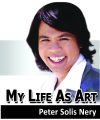 TODAY, I yield my column space to this essay from my latest book, “At My Father’s Wake” (available at Amazon.com).
TODAY, I yield my column space to this essay from my latest book, “At My Father’s Wake” (available at Amazon.com).
T. Randolph Graydon knew what he was talking about because we lived together for eight years.
(Six years of those as a married couple).
This is one of the last things Randy Graydon ever wrote.
*
The Necessary Poet
by T. Randolph Graydon
Nobody wants to write an elegy. Especially not an elegy for one’s own father. Even if the elegy is rather modern, and no longer a melancholic song of lament to praise the heroic deeds of the dearly departed.
*
But Peter Solis Nery is not Nobody. In fact, he is an essential poet—a necessary poet. Necessary because his poetry is a response to a need for the expression of a human experience (even the most difficult, the most tragic) in terms and language that readers can easily identify, but may not have the facility to articulate.
*
Nery wrote, not one, but ten elegies for his father. But the elegy collection did not just come from his need to verbalize his deepest feelings and use poetry to heal his loss, grief, and broken heart. He wrote the elegies aware, and pretty conscious, of Rainer Maria Rilke’s ten-elegy collection, the “Duino Elegies”.
*
It can be argued that the ten elegies in At My Father’s Wake is a sly imitation of Rilke’s Duino Elegies; the Austrian poet being an important influence to Nery since he read “Letters to a Young Poet” when he was but twenty.
*
You see, there is always purposiveness in Nery’s writing. In a 2005 interview for an Ilonggo newspaper, he admitted that his 100 erotic sonnets in the Hiligaynon is a shameless response to Pablo Neruda’s “Cien Sonetos de Amor”. He didn’t want to simply copy Neruda and write 100 love sonnets in Hiligaynon; he wanted to do something more daring, more transgressive, more avant-garde.
*
When Filipino writers, and Western Visayan poets in particular, were mostly shying away from writing erotic and ribald poetry, Nery, the original premier agent provocateurof Iloilo and the whole Region 6, shamelessly published his erotic sonnets in the Hiligaynon.
*
He wrote, not one, but one hundred erotic sonnets, and published them in Ilonggo newspapers, one sonnet each day in 2006. Was there a need for the written expression of the erotic at that time? Perhaps there was none. But nobody was writing them.
*
And again, Nery is not Nobody. His philosophy, perhaps formed at U.P. in the Visayas where he studied Biology, and later taught Philosophy, was, “If not I, who? If not now, when?”
*
As agent provocateur, Nery always tries to push the envelope; and sometimes, he exceeds the limit, and crashes by breaking the taboo.
*
Nery’s ten elegies for his father may not be high poetry; they are not even elegies in the traditional sense; but they are, in many ways, necessary. Necessary for Nery—the poet, the son, and the artist constantly reinventing and positioning, even repositioning, himself as an important writer not only of Western Visayas, but of his beloved Philippines.
*
And, if we are honest, Nery’s elegies are important—yes, indeed, necessary—for those who have certain strained relationships with their fathers. The father-son tension in At My Father’s Wake are not the terrifying angels and salvation in the religious and mystical Duino Elegies. But they are close.
*
They are close because, as with Rilke’s ontological torment in the Duino Elegies, Nery, in his grief-stricken At My Father’s Wake sequence of elegies, goes on with his impassioned monologue/s as he comes to terms with his relationship with his father, in particular; and with human existence and existential suffering, in general.
*
Nery is, foremost, a storyteller. That he is also a lyric poet—even called the Prince of Ngoyngoy, or Prince of Sob Poetry, by his literature contemporaries—is a happy accident. Because just like how stories are important and necessary to turn the lights on to the dark shadows and corners of our own existence, so are Nery’s poetry that always inform, narrate, argue, and dramatize.
*
Because he puts into words, language, and metaphors what we feel deeply in our hearts, especially those feelings that are often too deep, too important, even too difficult to name and articulate, Nery becomes an important poet, a relevant and essential poet; and yes, I dare say, a necessary Filipino poet not only of his generation, but for all generations. (500tinaga@gmail.com/PN)

